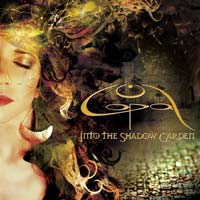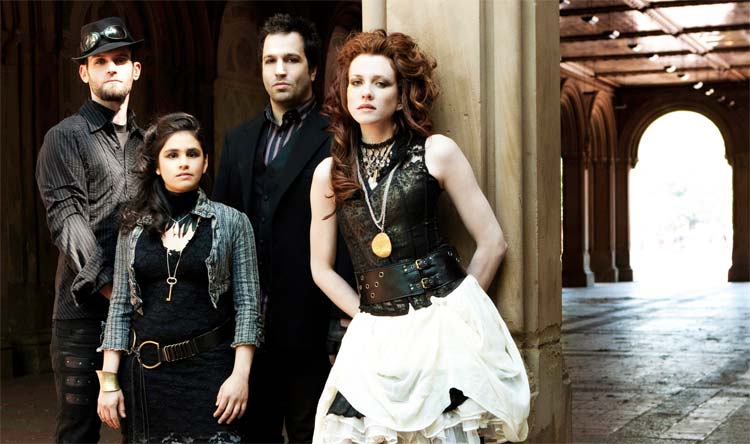Each week, World in Stereo examines classic and modern world music while striving for a greater appreciation of other cultures.
 Copal: Into the Shadow Garden (self-released, 11/4/2010)
Copal: Into the Shadow Garden (self-released, 11/4/2010)
Copal: “Roots”
[audio:https://alarm-magazine.com/wp-content/uploads/2010/11/Copal_Roots.mp3|titles=Copal: “Roots”]
A profound understanding of past worlds and global traditions are required to make music like Copal does. The New York City-based music collective specializes in old-world sounds with careful modern flourishes, drawing influences from a wide variety of ancient societies. Copal’s debut album, Into the Shadow Garden, has a meditative sophistication; it’s a string- and percussion-driven album that recalls a time when these instruments alone were used to express a musical ambiance and atmosphere.
At the center of the album’s rotating cast is violinist, vocalist, composer, and producer Hannah Thiem. Thiem’s Eastern European, Nordic, and Spanish Gypsy styles takes a leading role in the overall vision. Joined by cellists Isabel Castellvi and Robin Ryczek, the three musicians provide a strong foundation with an interplay that is sometimes haunting and always imaginative. Coming together to create a sonic tapestry of different textures and sounds, the violin and cello inspire a romantic vision of old-world elegance.
But amid the group’s sensitivity of the past, there are subtle inclinations towards electronics. Drummer Karl Grohmann, percussionist Engin Gunaydin, and bassist and keys player Chris Brown keep Copal’s sound well rounded. From ethnic percussion to indie-rock drum fills and subtle Fender Rhodes sustains, the music is also relevantly rooted in modern composition. The result is a mix of old and new tastes, the latter acquiring direction from the former.
Pinpointing Copal’s overall sound would take a lot of traveling through Eastern and Northern Europe. In spirit, the group draws influences from Gypsy music, a style of music that has trekked thousands of miles, lasting centuries and spanning countless numbers of cultures. The music has a long history that began in the north bloc of the Indian subcontinent in the 11th Century. When the Romani people dispersed to Egypt (where the derogatory term “Gypsy” was coined), their nomadic lifestyle brought them to Turkey and ultimately into Europe via Armenia by the Middle Ages. A musical history that spans the Ottoman Empire, to origins of Spanish flamenco in the 1500s, to Parisian jazz of the 1930s, Gypsy music is as diverse as its diaspora.
“Roots,” the album’s opener, begins with a low-timbre electronic hum over a thumping drum riff. When the violin enters, the tone is sweet, but the melodic energy is mysterious. There are traces of dark Nordic melodies, but the curious intonations and accompanying percussion points to the Middle East.
Into the Shadow Garden is filled with subtle tinges – an array of influences that combine to make sultry and vibrant sounds. “Ungaro” is an upbeat tune that takes derision from the fiery and passionate flamenco rhythm structure. “Ether,” in contrast, is one of two vocal tracks on the album and is a somber offering. Thiem’s swelling violin solos are beautiful and tense, interspersed by the spoken-word German that is backed by mournful strings and somber drums.
Although dubbed as electro-acoustic, there isn’t much happening on the electronic side other than faint atmospheric keyboard parts. The album hinges on Copal’s ability to transport listeners to a different time and place in its history-sensitive compositions. The group is able to make simple arrangements because its ethereal compositions are extremely distinct. And beyond its sparse modern embellishments, Into the Shadow Garden successfully shares Copal’s old-world sensibilities with the modern age.

